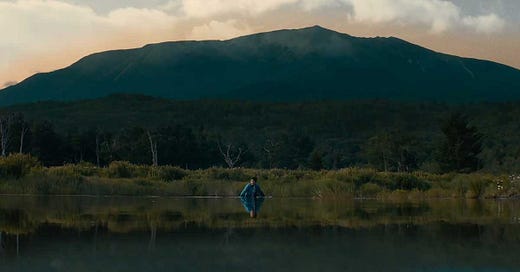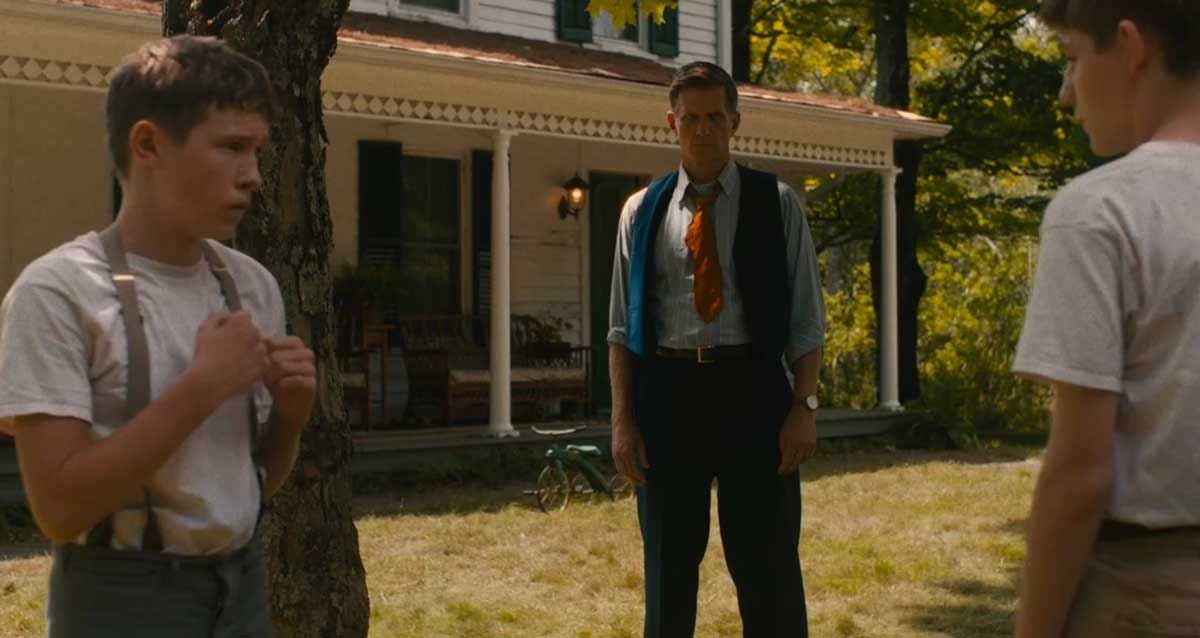
The Free Press

You beamed. You cried. You commented in the hundreds. Free Press readers responded overwhelmingly to Elias Wachtel’s piece, “On the Appalachian Trail, I Fell in Love with America.” It ran on July 19, exactly three years after 22-year-old Elias—who is part of our first generation of Free Press Fellows—completed the 2,193-mile hike from Georgia to the highest peak of Maine, Mount Katahdin.
“It’s true that no one can get you up the mountain but yourself,” he wrote. “But as I reached Katahdin’s summit, I thought about my family, and my friends on trail. . . and the generations of Americans who cut the trails we walk.”
One of those Americans is Donn Fendler. Eight decades before Elias summited Katahdin, Donn got lost in a storm on the very same mountain, at the age of 12. A monumental search effort immediately began. It was July 1939: Europe was on the brink of war, but all America could think about was this boy who, as the days ticked by, seemed unlikely to return to his family.
But return he did. Donn had walked a hundred miles, in cut-up sneakers and with little in his belly except berries. That same year, with the help of journalist Joseph Egan, he told the story of what happened in a book, Lost on a Mountain in Maine—which has been adapted into a film of the same name, out this month.
What’s most remarkable about Donn is his conviction that he’d survive. Although the odds were stacked against him, he was so sure he’d get home that he carried a heavy rock as a souvenir because, he recalled, “I knew Mommy would like it.”
Here, Elias tells the incredible story of Donn Fendler. —The Editors
In the summer of 1939, as clouds of war darkened over Europe, a boy named Donn Fendler was lost on a mountain in Maine. The 12-year-old had run ahead of his father and brothers to reach the peak of Mount Katahdin, the highest in the state, when a fierce storm blew in. In pelting rain and dense fog, Donn stumbled off the trail, unable to find his way back to his family. By the time they realized he was missing, his loved ones couldn’t shout his name loudly enough to be heard over the wind.
The race was on to find Donn before he succumbed to one of Katahdin’s many perils. A young friend of his family, who’d been hiking with them, hurried down the mountain and mobilized a small group of forest rangers who searched through the night. By the next morning, Maine State Police had joined in. Volunteers from local towns flocked to the mountain to help, and the Great Northern Paper Company sent men from its timber crews. Police brought bloodhounds to follow Donn’s trail, but their paws were cut up so badly by the rough terrain they had to be carried down the mountain. More dogs were flown in by New York State Police. Meanwhile, the governor of Maine ordered 65 National Guardsmen to Katahdin.
All the while, America held its breath. Donn’s story made headlines across the nation, and his mother, Ruth Fendler, began receiving telegrams—hundreds of them—from other moms across the country, telling her they were praying for her and her son. But as the days dragged by, hope began to flag. After a week, most searchers assumed they were looking for a body rather than a boy.
Then, miraculously, the nation’s prayers were answered. Nine days after Donn had last been seen, the owner of a small cabin on the Penobscot River—35 miles east of Katahdin—contacted the authorities to tell them about the boy who’d wandered onto his property. Donn was exhausted, bloodied, half-naked, and skeletally thin; he’d been subsisting on berries and stream water, and had lost 16 pounds. It’s thought that he walked at least 100 miles, using what he remembered from the Boy Scouts to follow a small stream and, eventually, a telephone wire back to civilization. Meanwhile, the search parties had never even left Katahdin, thinking it impossible that a boy his age could have made it down the mountain alive.
That boy became a national hero.
On the night he reunited with his parents, Donn told his story on NBC, and in the days and weeks that followed, he repeated it countless times with surprising acuity, although his memory of the last few days was muddled by starvation and exhaustion. With the help of the writer Joseph B. Egan, Donn also published a book that same year, entitled Lost on a Mountain in Maine. It has recently been adapted into a film of the same name which came out November 1, produced by Sylvester Stallone, and it aims to introduce a whole new generation to Donn’s story.
I first learned his tale of survival from my mom.
As I wrote in The Free Press earlier this year, I have my own—less dramatic—experience of Mount Katahdin. It was at this summit, three years ago, that I completed a five-month through-hike of the Appalachian Trail. And it was a few days later that my mom picked up the book Lost on a Mountain in Maine. She hadn’t let herself read anything like it while I was actually out on the trail—books like this one are nightmare fuel for any mother whose son is trekking through the woods alone. But after I got home, she became obsessed with them. That’s the thing about survival stories: The whole genre is predicated on knowing it’s going to be alright in the end.
When we read one of these accounts, though, we’re getting a glimpse inside the head of someone who doesn’t know. There is only terrifying uncertainty. “I started to run and found I couldn’t, because of the boulders; that made me frantic and I climbed over them like a cat and yelled and shouted and cried all the time,” recalled Donn, of the moment he realized he was lost. “I yelled for my dad. I climbed up as high as I could on a big rock and screamed for him—then I waited. No answering shout—nothing—just the noise of that wind and the purring sound of fine sleet driving against my clothes.”
There’s very little that my experience on the trail had in common with Donn’s: I was, for the most part, completely safe, and never very far from help. Finishing the Appalachian Trail requires grit, and luck, and a tolerance for pain, but it’s no survival story. But I do remember what it feels like to have wet clothes on when the temperature starts to drop. To have the icy wind whip your skin until it burns. To tell yourself: Don’t panic.
It makes me admire the quiet resilience of Lost on a Mountain in Maine all the more. By the end of his first night, Donn’s sneakers are ripped open by rocks. His bare feet are left numb and battered. In the days that follow, he gets covered in leeches and swarmed with insects so badly that he loses a serious amount of blood. On the fourth day, he looks down and realizes his left foot “had a slice cut right out of it”; on the eighth, he notices “the tip of my big toe was gone.” Somehow, he keeps going: He’s convinced he’ll come across civilization at any moment.
Later, he learned that when he thought he was walking in the direction of his family, he was actually—with every step—leaving them farther and farther behind. “It’s a good thing I didn’t know any more than I did,” he writes. “Sometimes, not knowing the worst helps a fellow along.”
Donn had the kind of simple, steadfast faith many of us had as children—the kind we lose sight of until a story like this one reminds us of it. Despite his ordeal, he still said his prayers every morning, even as he slowly succumbed to hunger, fatigue, and pain. Donn is a boy who ultimately attributes his survival to his “guardian angel.” “He was pulling me along,” Donn told his father afterward.
In the end, I was left wondering if only a child could have done what Donn did.
It’s hard to read Donn’s story now without thinking of what his generation of boys would go on to face. Millions of them would fight for their country in the Second World War—including Donn, who joined the U.S. Navy in 1944 and, after the armistice, dedicated another three decades or so to the military. When he retired, Donn spent much of his long life speaking to schoolchildren across Maine, where his book has become a children’s classic, and a frequent required read in grade schools. (Donn died in 2016 at the age of 90.)
There’s a perennial impulse to shield children from things that are frightening, even in the stories we tell them. But there’s a reason so many kids have loved Lost on a Mountain in Maine. It’s full of conflict and struggle, of horror and disgust, and larger-than-life challenges: The things all great stories are made of. Donn understood that when we tell kids they can do hard and incredible things, they’ll want to grow up to do them. To shut these things out of a child’s imaginative life is actually to reinforce their fears.
It is also to impoverish our own understanding of the world along the way. Reading Donn’s story reminds us that there are virtues to a child’s point of view, things children see more clearly than the rest of us do. And there is plenty we can learn from them, about hope, and survival.
Elias Wachtel is a Fellow at The Free Press. Read his piece “On the Appalachian Trail, I Fell in Love with America.”
To support our work, subscribe today:






